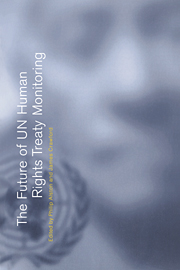Book contents
- Frontmatter
- Contents
- List of Tables, Figure, Appendices
- Notes on Contributors
- Editors' Preface
- Table of Treaties
- Table of Cases
- List of Abbreviations
- 1 The UN human rights treaty system: A system in crisis?
- A The UN human rights monitoring system in action
- B National influences and responses
- C Regional and sectoral comparisons
- 15 Reporting in the Inter-American system of human rights protection
- 16 Lessons from the reporting system of the European Social Charter
- 17 The role of reporting in international environmental treaties: Lessons for human rights supervision
- D Common challenges for the treaty bodies
- E Looking to the future
- Index
17 - The role of reporting in international environmental treaties: Lessons for human rights supervision
Published online by Cambridge University Press: 23 December 2009
- Frontmatter
- Contents
- List of Tables, Figure, Appendices
- Notes on Contributors
- Editors' Preface
- Table of Treaties
- Table of Cases
- List of Abbreviations
- 1 The UN human rights treaty system: A system in crisis?
- A The UN human rights monitoring system in action
- B National influences and responses
- C Regional and sectoral comparisons
- 15 Reporting in the Inter-American system of human rights protection
- 16 Lessons from the reporting system of the European Social Charter
- 17 The role of reporting in international environmental treaties: Lessons for human rights supervision
- D Common challenges for the treaty bodies
- E Looking to the future
- Index
Summary
Introduction
Apparently, the grass often looks greener across a disciplinary fence. International environmental lawyers, if asked what lessons they can teach human rights lawyers, might well respond that the inquiry gets the matter backwards: they tend to look with envy on human rights implementation mechanisms. Thus, it comes as a surprise to be asked whether there is anything to be learnt in that regard from international environmental law.
Certainly, many of the problems that plague human rights reporting are present in international environmental regimes: national reports that are inaccurate, incomplete, tardy or not prepared at all; superficial reviews by international bodies; and a proliferation of reporting requirements, leading to fears of treaty congestion. A 1992 report by the US General Accounting Office (GAO) concluded that close to half of the reports required by the Montreal Protocol on Substances that Deplete the Ozone Layer (Montreal Protocol) – perhaps the most successful of all international environmental agreements – were incomplete, and for many important agreements, fewer than half of the parties have ever filed a report. Even when reports are submitted, they may be inaccurate, even deliberately deceptive. The disintegration of the Soviet Union brought to light two blatant cases of misreporting, one relating to whaling and the other to the dumping of radioactive waste at sea. So there should be no illusion that reporting systems generally work well in environmental regimes.
- Type
- Chapter
- Information
- The Future of UN Human Rights Treaty Monitoring , pp. 361 - 380Publisher: Cambridge University PressPrint publication year: 2000
- 3
- Cited by



